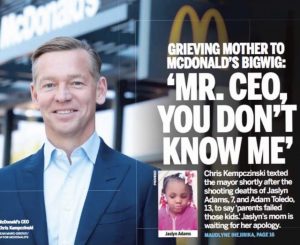By Hermene D. Hartman
Chris Kempczinski, the President and CEO of McDonald’s, showed no remorse, compassion, sympathy, or empathy as he spoke about parenting to Mayor Lori Lightfoot. First, a policeman killed Adam Toldeon, 13 years old, on the premises of McDonald’s. Weeks later, a seven-year-old girl, Jaslyn Adams, was killed in the drive-thru lane at McDonald’s on the West Side Side of Chicago.
The president of the $20 billion corporation, texted Mayor Lightfoot after a face-to-face visit at the McDonald’s headquarters, “With both, the parents failed those kids, which I know is something you can’t say. Even harder to fix.” By his own admission, he told The Wall Street Journal, “I have, through my background a very narrow world view. “My to comments to Mayor Lightfoot revealed that ignorance.” Mr. Kempczinski is Swedish. How many worldviews do you need to feel for the parent, whose seven-year-old daughter was killed in the drive-in of McDonald’s? All seven-year-old wants to go to McDonald’s.
He spoke as a racist, white privileged, prosperous affluent male, who is insensitive. His reported salary in 2018 was $4.678 million. If he knew you could not say it, why did he say it? What made him so comfortable with Mayor Lightfoot, Black, and female, that he could text what he wrote.
Who is he to speak on parenting in the first place? And when he texted such a message, where was Lightfoot’s response? Perhaps she called him or had a zoom meeting. If so, she should make her comments public. It’s like she excused him.
He spoke aloud. We hear him. McDonald’s is a racist company; they practice “systemic racism” throughout.
In 2020 the company made $20 billion. Thirty percent of their company consumer base is Black. Blacks produced $6 billion of their total income. In 1998 there were 377 Black McDonald’s franchisees. Today there are 186 out of 1300. Don Thompson was the Black CEO of McDonald’s from 2012 to 2015. When he retired, so did many of the top Black executives. In 2019 McDonald’s spent $1.6 billion in advertising; less than $10 million of those dollars were spent with Black-owned media.
Byron Allen, the founder of Allen Media Group, filed a lawsuit for $10 billion against McDonald’s, stating the company discriminated against Black-owned media back in May 2021. According to the case, the fast-food chain has a “tiered advertising structure that differentiates based on race. He has also ta

ken out full-page newspaper ads pointing to the racism in McDonald’s Black ad spend. After Byron’s ads appeared, McDonald’s quickly added $10 million to the black budget. But where did it go?
I had a harrowing experiment with McDonald’s as I spoke to the head of advertising, Sheila Hamilton. It was a circus. A call had been initiated with discussion, where the new advertising lady listened to our pitches. I followed up with her to discuss TV advertising. Then, the circle of do nothing began. She told me about the Black McDonald’s owners, who do an excellent job with their dollars to support the Black community in multiple ways.
I asked questions about the $10 million extra – What agency did it go to? What was the spend? When would it be executed? I spoke to a White agency and provided three different people with the basic information requested. Eventually, I was sent to two Black agencies, who claimed ignorance about the new $10 million. One agency never returned calls.
I went back to the advertising director of McDonald’s, to say stop playing games and sending me on a wild goose chase. If you are not prone to advertise, say that and be upfront about it, but don’t insult my intelligence. She told me she would have the Black agency, Burrell, call me. I never got the call, and the advertising lady disappeared, not answering the tough questions. The run-around ended.
Back to Mr. Chris Kemczinski. Mrs. Lanesha Walker, the grieving mother of seven-year-old Jaslyn Adams, spoke to Maudlyn Ihejirika, who writes “Chicago Chronicles” for the Chicago Sun-Times. She said, “Mr. CEO, you have no clue what it’s like to live on the South Side and West Side in the trenches, where it gets real treacherous just to protect your children; you come from privilege. You can’t speak about me.”
Ms. Walker wants a direct apology from Mr. Kempczinski. He owes her an apology, a private one and a public one. He is not fit to be CEO of a $20 billion company. He is an example of how white privilege and systemic racism lives and is perpetuated. He not only showed Ms. Walker disrespect, but he also disrespected his consumer, his significant customer.
McDonald’s fast food is not the healthiest. It can lead to hypertension, diabetes, and definitely obesity. I hope Black folk at every level, the consumer, the Black-owned media, the customer, and the franchisees don’t take the insult. Let’s disappear from McDonald’s. Perhaps they should have a lesson in cancel culture. Since my conversation with the McDonald’s Chief Marketing Officer, I have vowed “hell no” to McDonald’s with its many agencies. Their business model is racist all around. It’s not the advertising; it is the insult.

We have to challenge the business model. Disrespect for your customer is not an option; it is mandatory. If Kempczinski’s lifestyle and experiences are beyond the reach of his customer, he probably shouldn’t be the CEO.
If the president of a company cannot respect his client, he should not be at the helm. He is not emotionally qualified. When Byron Allen raised the question of McDonald’s advertising with Black-owned media, McDonald’s gave the traditional civil rights organizations $1 million donations, half to the Urban League and to NAACP. Corporate hush money.
Not enough McDonald’s. An apology is required directly to Mrs. Walker. In fact, why don’t you do an apology commercial?
More Black franchisees.
Enough of the insult.
And Mayor Lori Lightfoot, we await your response to Kempczinski’s text message. Meanwhile, band McDonald’s from your menu.

 Westside Story Newspaper – Online The News of The Empire – Sharing the Quest for Excellence
Westside Story Newspaper – Online The News of The Empire – Sharing the Quest for Excellence






